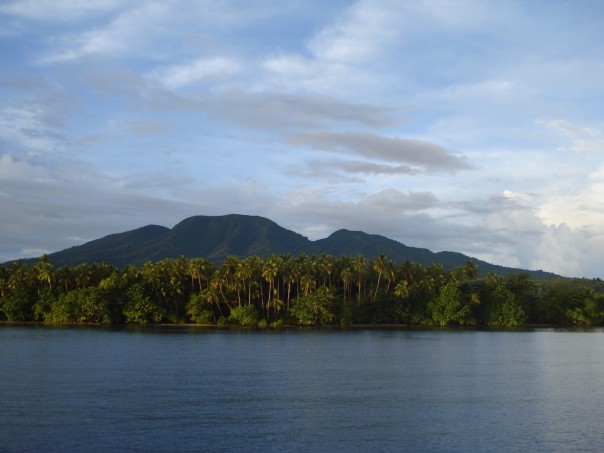
Picture: A view of rainforest covered islands in the Western Province of the Solomon Islands. THOMSON REUTERS FOUNDATION/Catherine Wilson
Source: Thomson Reuters Foundation
An international summit aimed at stemming rapid deforestation in the Asia Pacific region has fallen short of expectations, according to environmental experts and Pacific Islanders who sought significant actions to combat both climate change and corruption associated with illegal logging.
“I think more hot air was produced during the forum than will be saved in the long term, but I would love to be proven wrong,” said Bill Laurance, a researcher on rainforest and climate change issues at the Centre for Tropical Environmental and Sustainability Science at Queensland’s James Cook University.
The two-day Asia Pacific Rainforest Summit sought to find practical action to reduce forest loss in the region, which is home to 6 percent of the world’s forests.
Nations including Australia, Laos, Papua New Guinea, Vietnam, Vanuatu and Fiji expressed support for the development of a rainforest recovery plan, which would aim to halve the rate of rainforest loss and restore 10 million hectares of degraded forests in the region by 2020.
Australia also committed $5.2 million to fight illegal logging, Papua New Guinea pledged to bring forward by a decade plans to end deforestationand Indonesia committed to conserving 63 million hectares of peat lands.
But observers said the commitments fall short of the action needed. According to WWF, at least $173 million is needed in the region to implement forest protection and anti-corruption measures, as well as improve land tenure reform and sustainable agriculture.
Paul Toni, a WWF spokesman, called for zero net deforestation by 2020, saying such a move would “benefit people (and) native animals and plants and help minimise the impacts of climate change.”
Lorraine Bower of the Australian Forests and Climate Alliance, a community group that held a peaceful demonstration in Sydney during the summit, also said that in her view the summit “has not pledged a great deal.”
"We need more than that,” she said.
From 1990 to 2005, Southeast Asia lost 42 million hectares of forest, Oceania 6 million and Australia 4.2 million, according to the U.N. Food and Agriculture Organisation (FAO). Remaining tropical rainforests cover an estimated 250 million hectares in the Asia Pacific region.
Forests support biodiversity, indigenous communities and protect watersheds, experts say. The felling of forests causes carbon in trees to be released as greenhouse gases and this contributes to about 10 percent of global carbon emissions, as well as causing changes in rainfall patterns.
Most forest degradation in subtropical Asia is driven by commercial logging aided by weak forest governance, experts say. Seventy percent of global illegal timber exports come from East Asia and the Pacific, and those were worth $17 billion in 2010, according to the U.N. Office on Drugs and Crime.
An estimated 80 to 90 percent of wood-based products from Myanmar, Cambodia, Papua New Guinea and Solomon Islands are derived from illegal sources, the report said.
In 2012, the Australian government passed an Illegal Logging Prohibition Act making it a criminal offence for Australian companies to import or process illegal timber.
During the forest summit, the government launched an online forest monitoring tool and committed $5.2 million to the Responsible Asia Forestry and Trade partnership program, which aims to build regional capacity to deal with forest issues.
But that sum “is a drop in the bucket,” Laurance said, noting it was “about the value of an average day’s worth of timber smuggled across the Laos-Vietnam border.”
Representatives of the Papua New Guinea non-government organisation, Act Now PNG, said the measures were not enough to address illegal logging in the southwest Pacific Island state, which they said has “endemic and systematic corruption” at its roots.
The FAO predicts 83 percent of Papua New Guinea’s commercially accessible forests will be degraded by 2021.
- Elizabeth1's blog
- Log in to post comments
